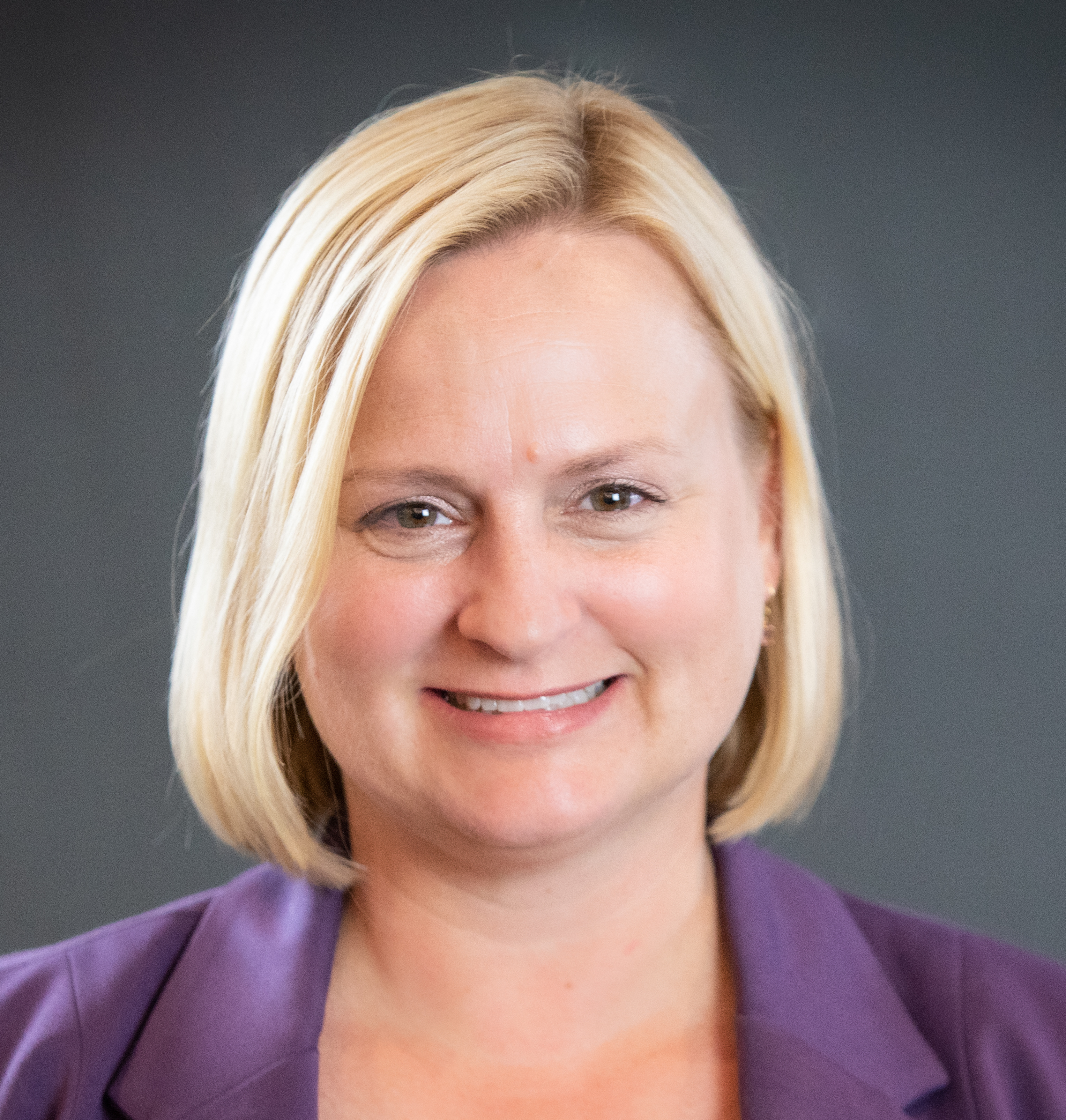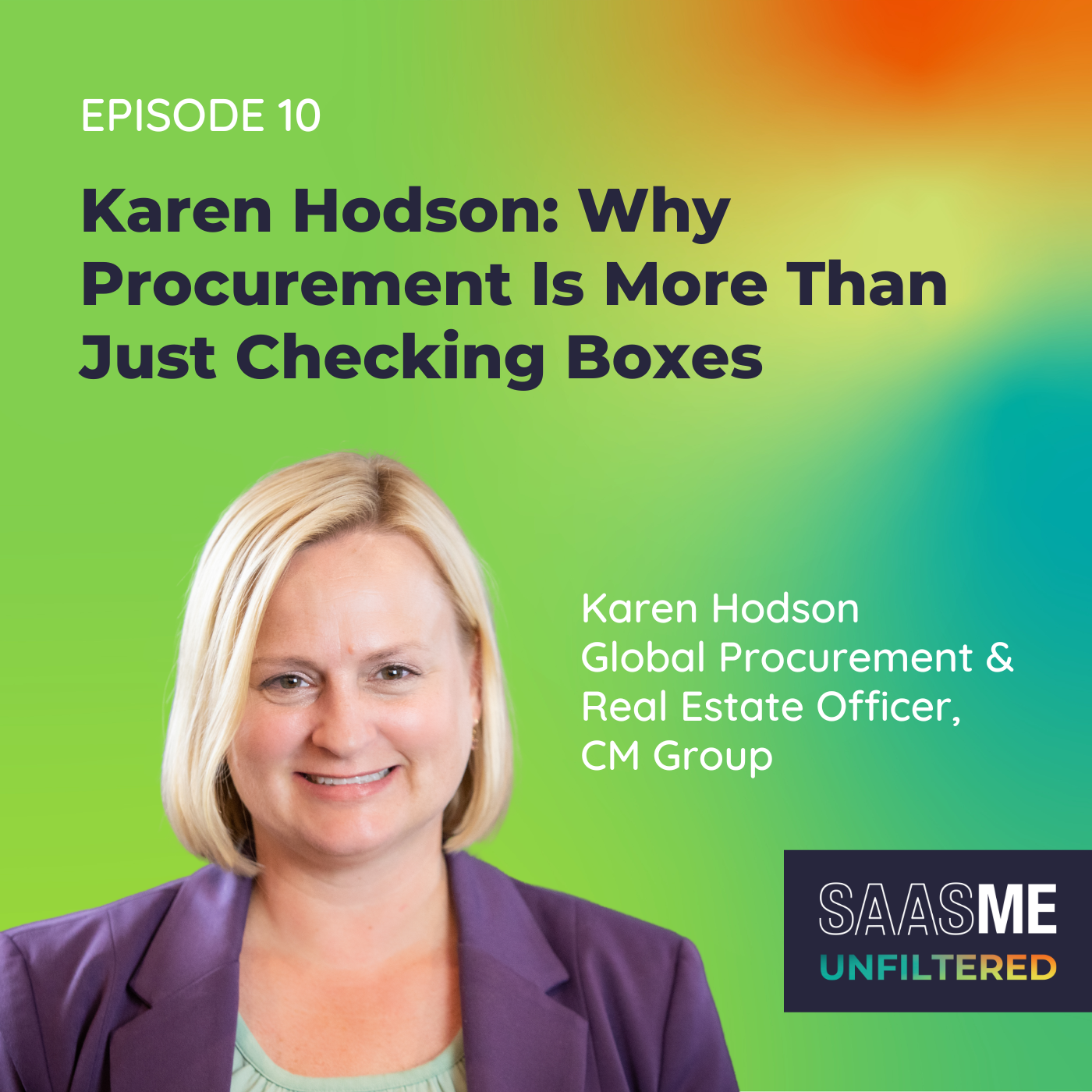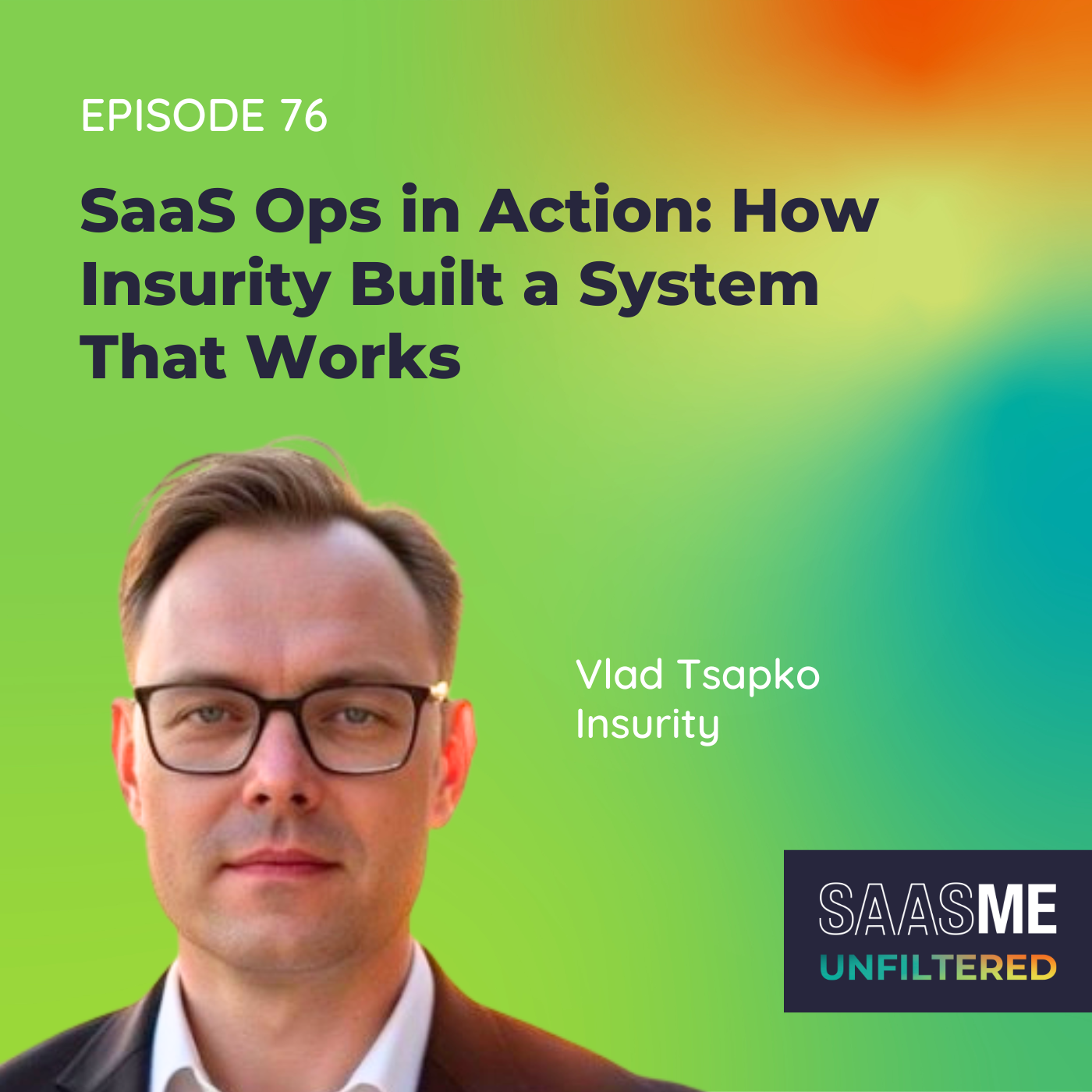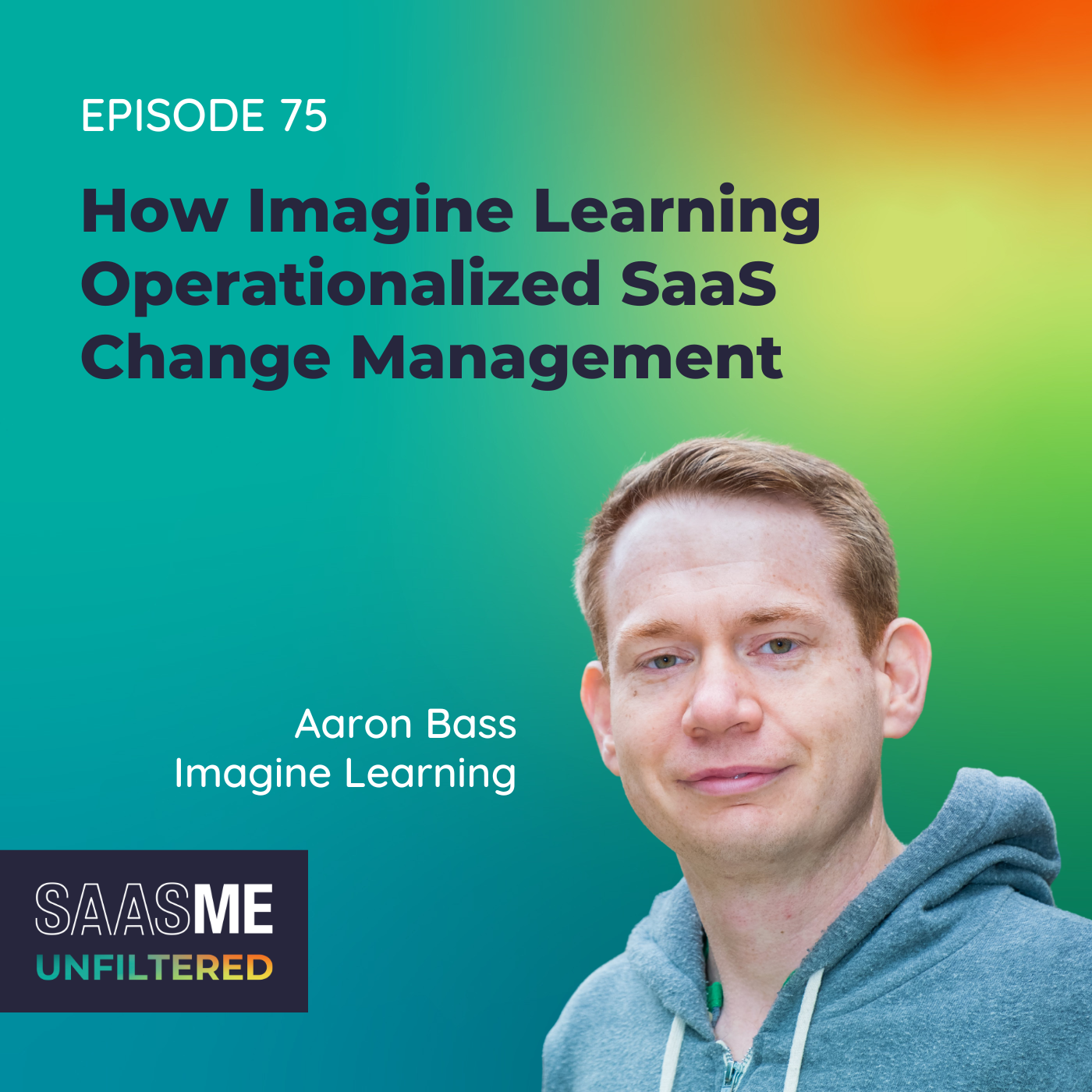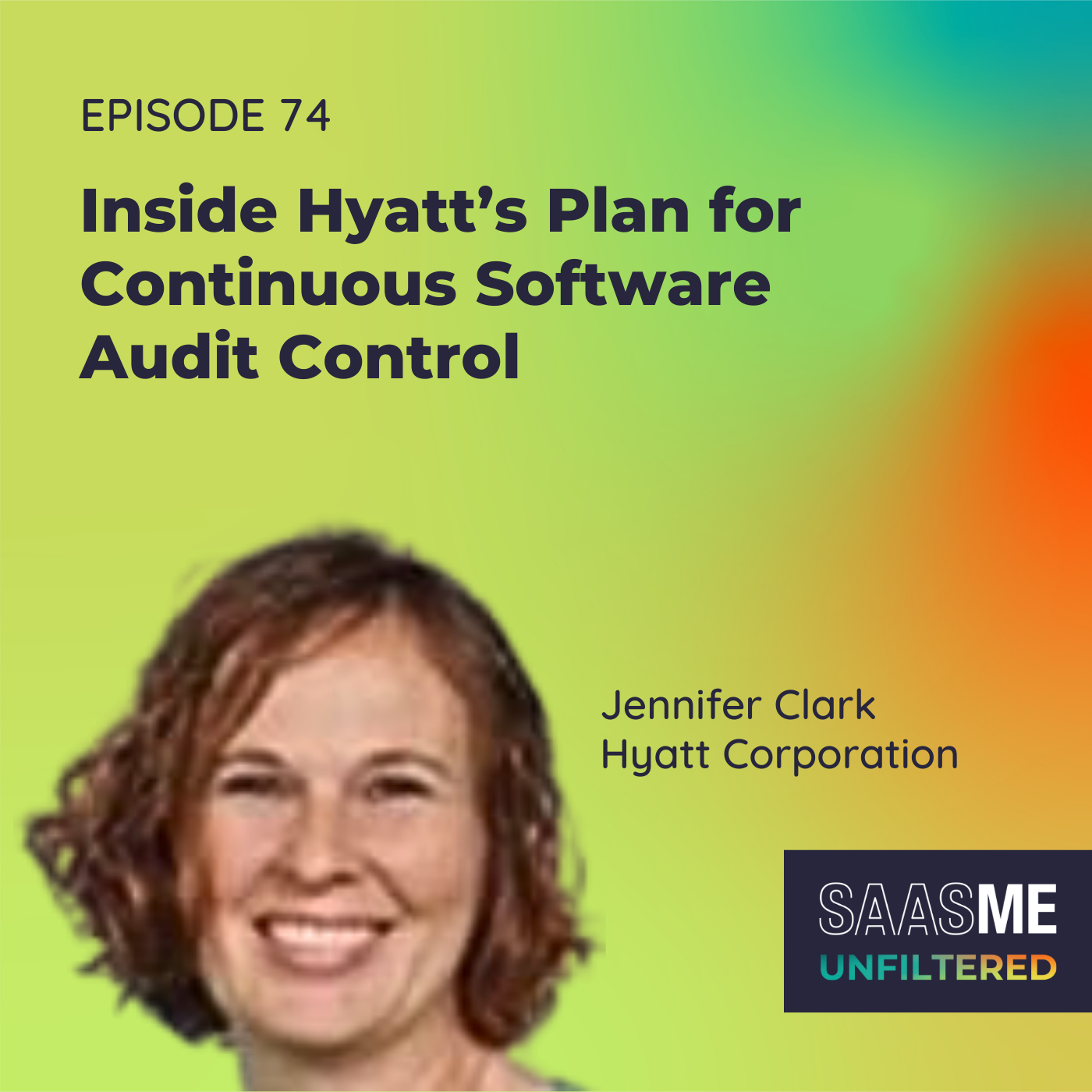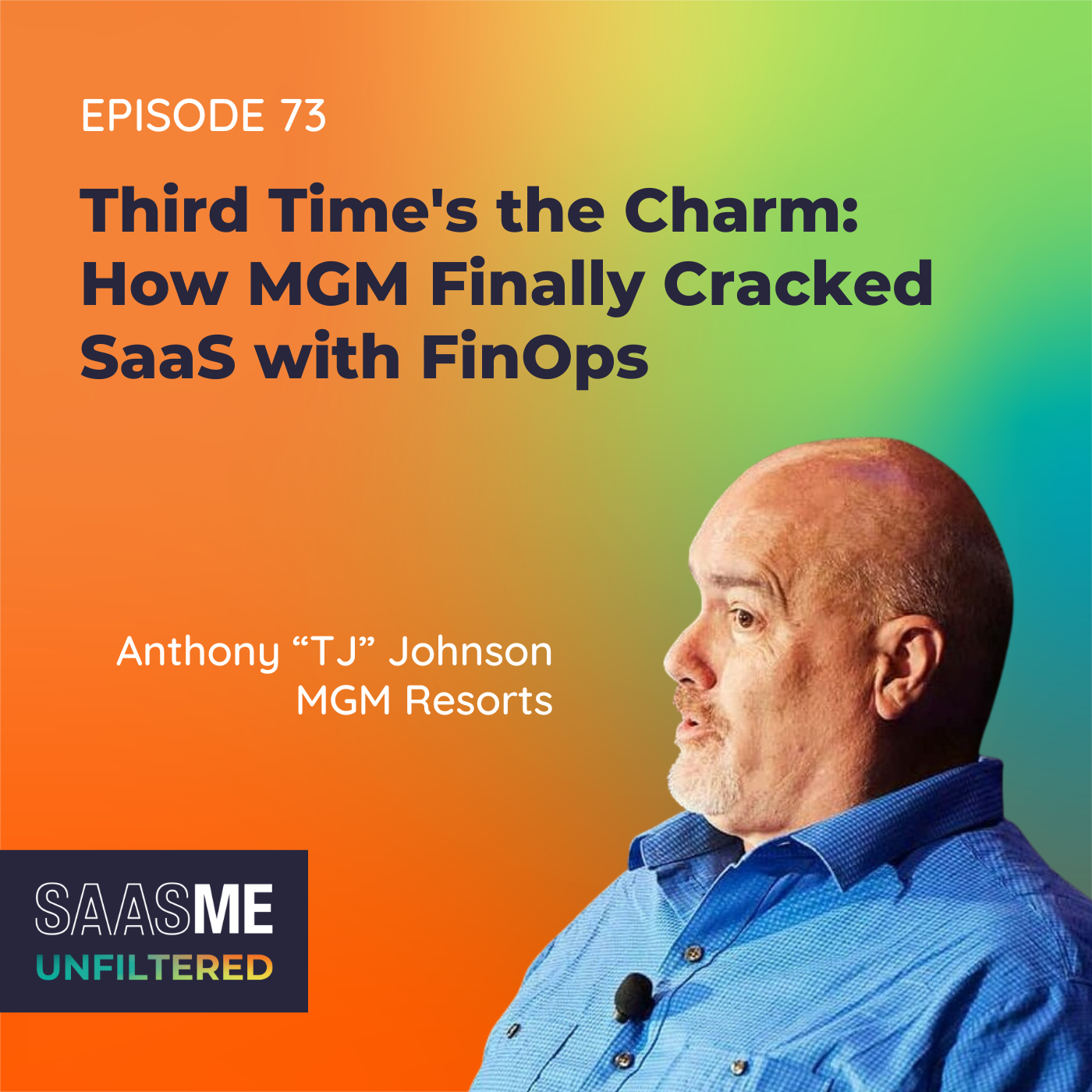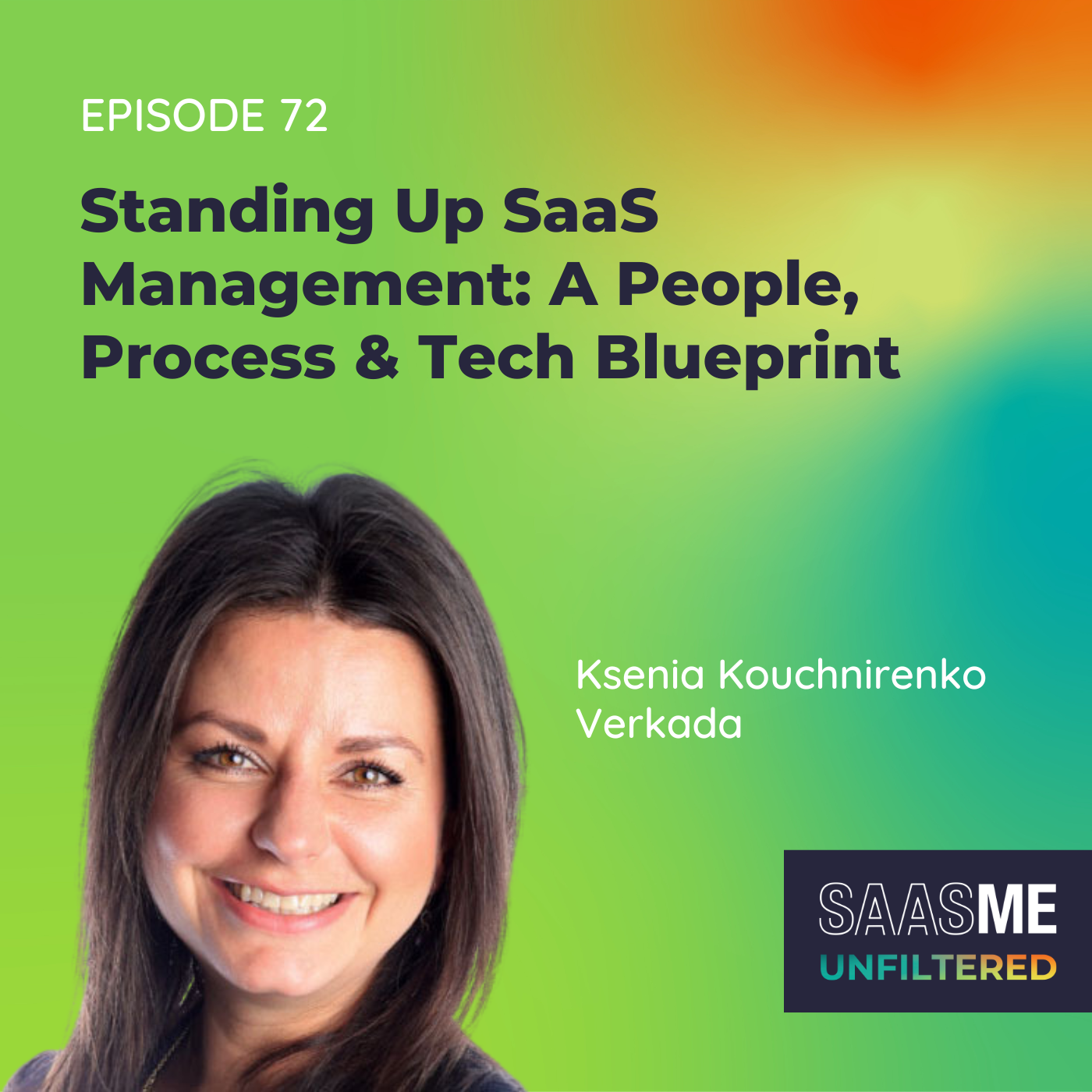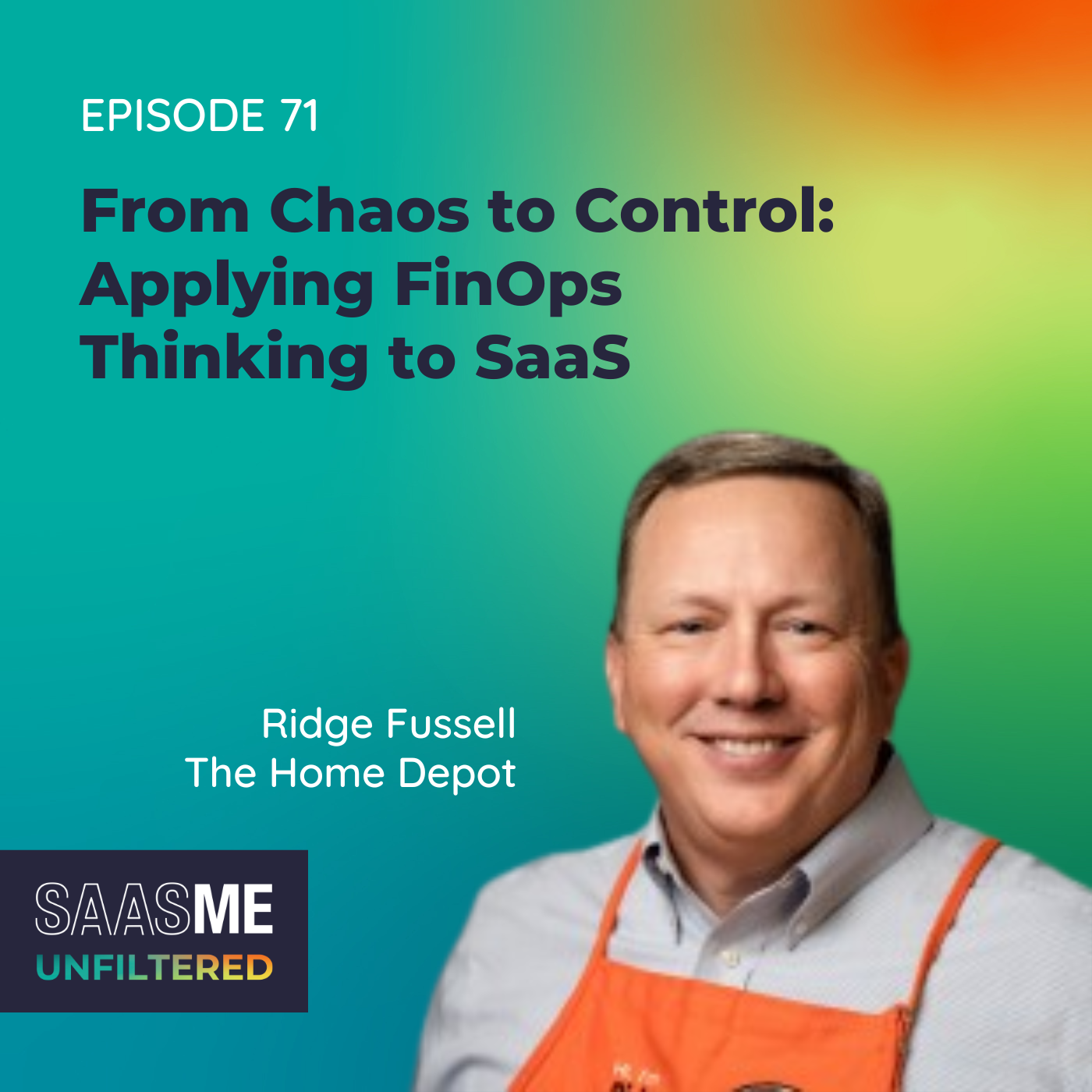Karen Hodson: Why Procurement Is More Than Just Checking Boxes
- 0.5
- 1
- 1.25
- 1.5
- 1.75
- 2
Karen Hodson: I see procurement really sitting in an organization these days is that we break down those walls, we bring everyone together, we make sure we're buying the right things for the organization, not just a department. We make sure we're reducing that risk that we might bring to a company by engaging with an outside party. It seems to really give a different picture to the pieces in the company, right? The executive team is seeing it in a different light and having a better understanding of the value it can bring.
Cory Wheeler: Hello, hello, and welcome to SaaSMe Unfiltered, the SaaS management podcast. The show with give it to you straight, real life advice from pros knee deep in SaaS every single day. SaaS management superheroes, just like you. We are back for another episode of SaaSMe Unfiltered. Really excited to have you join us. I'm Corey Wheeler, Co- founder and Chief Customer Officer here at Zylo.
Ashley Hickman: And I'm Ashley Hickman, Manager of Customer Success at Zylo.
Cory Wheeler: Okay. We have a wonderful guest joining us this week. I'm personally pretty excited about this one. This guest began her career in a law firm of all places, after college, looking into potentially law school and then went through and took on an organizational management degree instead. Much more applicable to what she'd be doing in the future. From there, she moved into SaaS, her first foray into the SaaS space with a stealth startup that went from five to 500 employees in five years. They went public then private again, and really she was able to experience a lot of growth and starting experience in ops and procurement. She began negotiating for her department all the way up until they put her in charge of procurement there. She then moved to another SaaS company and then really missed that startup world and dove back in where she finds herself today at CM Group. She's building processes, policies, and procurement, but she's doing more than that, she's owning real estate and facilities and insurance and taking on a lot of M& A activity. We are so excited to welcome Karen Hodson, the Global Procurement and Real Estate Officer at CM Group, to the show. Karen, welcome.
Karen Hodson: Thank you so much for having me.
Cory Wheeler: I'd love to understand a little bit more about CM Group. How did CM Group come together? I know there's been a lot of M& A activity, but maybe give the listeners a little bit of an overview of CM Group, the company in general.
Karen Hodson: Sure. So, I joined Emma, which is part of CM Group now, a little over five years ago, and about almost a year into it the birth of CM Group started with the merge of Emma, Campaign Monitor, and Delivra, all email marketing service providers. And since then, we've continued to have a merge with another email service marketing providers over the last couple of years, for a total of nine companies. And the goal of that really for the organization is so that we have every tool that we can provide to marketers out there. Anything that they may need, that's our goal, is to have the tool that will provide it for them, whether it's a small business, Fortune 500, private institution, public, whatever it may be.
Cory Wheeler: Nine companies coming together over time probably gives you a very unique view into how to operationalize that and build procurement. So, that's fascinating.
Karen Hodson: I learned about merging companies together in the last four years than I've ever thought I would ever learn and hopefully each time it's better and I'm perfecting that task, but there's always more to learn each time.
Ashley Hickman: Absolutely. So, would love to hear a little bit about diving into for CM Group, hearing about the SaaS strategy. You mentioned nine acquisitions, that's a lot, right? I'm sure a lot of different team members are constantly being added to the mix, constantly expanding with SaaS being such a distributed category, but especially with M& A. So, would love to hear how that strategy is for CM Group.
Karen Hodson: I mean, I think it's important to understand right, CM Group itself, we are a SaaS company, so we are in the world of SaaS because that's what we sell. So, I think that gives us an understanding when we go to figure out how to run our business. So, utilizing other SaaS tools is really key to running a business, and we know that better than some companies because we are a SaaS company ourselves. So, that's really key. With all the M& A, right? Every time we merge with another organization, really we're just birthing a new company, right? It's never one company and then you just bring them into the fold. It is, how do we come together to create something better? It's constantly evaluating all of the SaaS tools that live with one company and live with the other. Zylo is a key tool that we utilize to do those evaluations, to see what's out there, and pull them together. And then also all the different people that engage with these SaaS tools that we're buying, right? Every department utilizes a SaaS tool. So, there is not a single department in any of the organizations we've merged with that doesn't buy SaaS for some way to perform their job.
Ashley Hickman: So, in terms of looking at that org- wide level, what we see a lot is definitely SaaS management being a team sport. So, I'd love to hear a little bit more about what that team sport looks like. What does the team look like at CM Group, with procurement, with other departments, what that lay of the land, how that looks?
Karen Hodson: It's really important when we're evaluating all of our purchases, right? I mean, that's the role of procurement, but we're really the glue in the company that brings all the other departments together, right? And making sure that there's some clarity from the overall company strategy across these departments and getting those involved that need to be involved, right? So, maybe marketing needs to be buying a SaaS tool, but in that evaluation and in that purchase, well, legal needs to make sure they're good with it, right? Security, privacy, finance. So, we really help usher everyone through the review and approval of those things, right? And different departments will own it. Many companies try to saddle IT ops with SaaS tools and running them and owning them, which really doesn't make sense. Right? They really should be a partner in managing those tools with the department that has a need for it, right? Marketing is going to have a better understanding of the reason that they need a particular tool and the goals that they're trying to achieve by having that engagement, and then IT ops might be there to help support maybe a single sign on cut in a connection, or onboarding and offboarding employees into that tool, but it's not their role to understand the reason for that tool. So, it's really important that there's some way to centralize the understanding and the overall buy and management of these tools. And that's the role of procurement, right? Is we have those conversations with the different departments to really understand," Why do you need these things? Okay, how does it affect the organization positively or negatively?" Right?" And what are the risks that are being brought from these engagements?"
Karen Hodson: And making sure that everybody understands how
Karen Hodson: and why we need those things.
Cory Wheeler: You've really broken down from a macro level to really how we think about it with our customers today. It's fully distributed. IT doesn't even own software. Every person that licenses software, that begins a subscription, they own that software and it needs to remain that way, and the other groups are enablers within the business. You've often talked about your department strategy. How do you execute that? How do you set that up? What are the core components of you running a department strategy internally at CM Group?
Karen Hodson: What we try to do is we meet with the different departments, typically department head, and then they'll bring in their key players in their team that really oversee the mass majority of the SaaS purchases, right? We run reports, we utilize Zylo to evaluate the actual use of these tools, right? How many users licenses do we have? How many are being utilized? How much spend do we have? When are renewals coming up? And we will sit typically on a monthly basis and evaluate what's coming up in the next 30, 60, 90 days? Potentially longer, depending on the tool, right? Some take a lot to turn over or change, so you really have to be ahead, right? It's about being proactive versus that reactive. And the only way to be proactive is to have the conversations with those that are buying these tools or wanting these tools, to understand their need. Well, are they happy with them? Is it giving them what they expected? Is the vendor holding up their end of the bargain with regard to the contract? Right? So, procurement have those conversations to really understand," Okay, will we need to expand use, we need to reduce use? Oh, you know what? We've had conversations with other departments and they started talking about having particular need of a tool that another department is already buying. Let's pool them together." Right? So, there's a lot of discussions with each department and because of that, we have this overall view of what everybody is buying. So, when these discussions happen, it will trigger like," Oh, you know what? We were just talking with a product department the other week and they were talking about similar needs as well. Let's have you guys talk together to see if there's a single tool or a tool that you might already have in our portfolio, that can solve for that need." Right? And we get people to talk. So, we're breaking down those walls between the different departments. Then we get more value out of the buy a particular tool. And it's just silly to have one department buy a tool and then another department I've actually seen where they have two separate contracts with the exact same vendor. Right?
Cory Wheeler: Sure. Sure.
Ashley Hickman: Yeah.
Karen Hodson: If you don't centralize the buying and the relationships with vendors, it happens. Right? Or, you'll be buying two different tools that do the same thing. So, having those conversations really are important. So, that's our role. We have those discussions typically on a monthly basis, we pull data from tools like Zylo and say," Hey, look at what you've been buying. This is what's coming up. Tell us, is it good? Is it bad? Where are we going with this? What's the reason for it?"
Cory Wheeler: Preach on. I often say, distributed categories really drive the strategic importance of procurement, elevates procurement. And there's no better example. So, well put, Karen.
Karen Hodson: Thank you. And then look, with the M&A it's really important. We have a new company that's coming together. We're creating a new company, right? When we're merging two together, we're basically creating a new company. And that means we have to look at the bigger picture of the two different and how do we make it a single picture? Right? So, utilizing tools like Zylo we take that and say," Okay, well, what's the same thing that both companies are buying? How do we merge those contracts together? How do we be more efficient with that?" Or," Now let's look at the similar tools." You might be buying two different e- signature softwares. It's like," Well, does that make sense to have two different ones? We're now one company, let's evaluate them and pick the one that makes the most sense for us to have a single selection." And also then taking the picture at the ones that they don't have at all. Well, is that one that this other group now should be evaluating and utilizing? So, maybe there's this growth opportunity. And then of course, the more you buy, the more buying power you have, which allows for more negotiation. Right? And most people think of procurement as, oh, we negotiate, we save dollars. Yes, that is one of the key functions of our role, but it has definitely evolved, I think, over the last five- ish plus years, we are more of a strategic player in an organization versus just checking boxes and making sure we're saving dollars. Right? It's about reducing the risk of an organization. Buying smart, not just cost effectively, but buying with intelligence behind that. So, that's how I see procurement really sitting in an organization these days, is that we break down those walls, we bring everyone together, we make sure we're buying the right things for the organization, not just a department. We make sure we're reducing that risk that we might bring to a company by engaging with an outside party. It seems to really give a different picture to the pieces in the company, right? The executive team is seeing it in a different light and having a better understanding of the value it can bring.
Ashley Hickman: Absolutely. I love hearing about the collaboration that you're fostering and as well as having those conversations with users, how they're actually using it around the requirements, because that's in terms of what I see with our customers being the most successful, they need to have the conversations around requirements. To your point, so you don't have two different departments who both have active agreements with Salesforce. We see that a lot, especially as organizations grow and also undergo those M& As like CM Group, right? That tends to be pretty common or you get to a size where things are happening, because people aren't having those conversations, there isn't that centralized force, that glue, essentially the glue that you are for CM Group. So, that's really awesome to hear.
Karen Hodson: I think that actually yes, as companies grow, you're going to see that, there's a lot more walls that you got to break down. But I actually think that startups, right?
Ashley Hickman: Mm- hmm.
Karen Hodson: Tech startups, they're trying to move so quickly and get things done and move forward, I think that that's actually where it breaks down quite a bit, right? Because if you don't have a centralized procurement, each department is just," Let's go. We got to move. We get this done." And they take action, they sign contracts and they move forward, right? And they're thinking about how they're going to get their jobs done and yes, how it fits into the bigger picture of what they're trying to achieve. Sales, obviously, they're focused on that revenue piece, but each department have their own goals that will lead to the top. But if they're not talking about the tools they're buying to get to those goals, that's when you'll start having the multi- contracts of the same vendor, because nobody's having the conversations with each other, because they're all focused on it. So, when you centralize procurement and you have a department that their sole focus is around understanding the engagements with vendors. And I think that I would probably guess that 90% or so of our vendors are SaaS vendors. This is just the world today, everybody utilizes software to get their jobs done. Right? I mean, could we imagine not having internet or a computer to achieve our-
Ashley Hickman: No.
Karen Hodson: I think back to the days of working in law firms and working on typewriters, no joke, right? And card index files and things like that. It's just, if you do not utilize software to run a business these days, I don't know how you can be a successful company, right? Let alone a global company, right? And we are a global company and without SaaS and technology, there is no way we'd be able to successfully grow and run our business without SaaS.
Cory Wheeler: I think you are probably the most experienced procurement professional I've met with M& A. The last four years, you've had a crash course in acquisitions and pulling companies together. At this point, do you have that procurement playbook that you run for a new acquisition? And maybe share a little bit about how you approach each one of those. Or, is it truly a unique project every single time you have a new acquisition? How does that work tomorrow when they say," Hey, we just acquired a new company." What are you immediately starting to think about from a planning perspective?
Karen Hodson: Yeah. Well, normally I get a little bit of a heads up, not much. I think that it's kind of a combo, right? You have these certain things that you know you need to attack and the path you want to go down each time that this occurs, right? But every organization is different, right?
Cory Wheeler: Mm- hmm.
Karen Hodson: So, it's still unique every time. You may have some core items and those core items are really evaluating like," All right, give me that list, let me know everything that you buy, every vendor you engage with." Which can be extremely daunting, right? And a lot of times you're going to be like," All right. Let's take the highest spend and work our way down and take a look at that." Because we're a software company, we use software to run our business, the number one thing I look at is the software purchases, right?
Cory Wheeler: Sure.
Karen Hodson: Consultants and that kind of engagements, audit companies, things like that, it's a little easier to evaluate because it's typically fewer of those that you're actually dealing with. Real estate's a big one because it's big numbers. So, the number one thing I look at is the software purchases, right? And I utilize Zylo, it is the number one thing that I work with when we're doing the M& A activity is utilizing this tool to pull the data from their finance teams. We already have our information there. So, we're pulling it from their finance teams, their expense tools, to know, what does this world look like? Right? And then I think second to that is then trying to track down the contracts. And sometimes that can be a hot mess, right? It's living in somebody's emails, maybe it's in a shared drive somewhere, if you're lucky, then you can go a place to find those things. So, really, dollars is where it speaks. So, Zylo pulls the actual spend and who is that spend going to? We have that evaluation and we work with your team to do that comparison between the current organization and the org being pulled in, and that's where we focus. And then we just dive in. And first we focus on same tools, then we focus on similar tools, and then third, we focus on totally different, like they have something and we don't, vice versa. What does that look like? And then it's really also about, okay, well, how is the organization's structure? Right? Do they have a legal team, a dedicated legal team? Who are their finance players? Who are their security players? Who are their privacy team? Okay. Many a times, making sure that those two are talking to each other," Hey, guys, we're all diving into this. Have you even talked? Let's get that conversation going." And then we have our set process that we work with, but when we do that merger," Okay, well, let me talk to you guys about how do you handle buying? What does that look like?" So, simultaneously evaluating the actual spend, we're talking to them about," Okay. When somebody wants to buy something, how do you guys handle that? Is it just, somebody goes and does it and finance gets an invoice and pays the invoice? What are your processes? How are you involving all these players?" We have, I think, a very robust approval process and evaluation process when we're engaging with vendors. Not all companies have that. So, it's saying," What do you guys do?" Right? Maybe they have portions of what we do and seeing what it is. And sometimes it's pleasant to see," Wow, you guys are really good at this piece. We actually like how you're doing that. We're actually going to modify the way we do that portion of procurement to pull in what you've been doing that's been super successful and that looks great." So, our way isn't the highway. Right? It is going," Hey, what do you do? What do we do? Who does it most effectively?" And sometimes we'll be like," You know what? Neither one of us do this great. How can we improve it as a team?" That kind of stuff. And really, that helps us get that buy- in from the organization as a whole, now that we're a new company, to move forward in an effective manner.
Ashley Hickman: Are you blown away by the amazing work our SaaSMe Unfiltered guests are doing? Now you can join them at SaaSMe, the industry's only SaaS management event. Hear from the experts, discover trends, and learn from the pros knee deep in this shit, every single day. Register today at saasme. com. That's S-A- A- S me. com. I really like that you are not only looking at, of course, the data, right? Looking at those inaudible, all of that, but also at the same time, addressing the processes, how are they actually procuring software? I'm sure procuring a lot of things, right? Because you are now responsible for everything from the pens to the most expensive real estate and software for that organization. So, really addressing all of that at the same time. I would imagine addressing some of those processes along with just the data that's in front of you, has helped you probably get out of some sticky situations that can certainly happen when people keep buying, even if they're now part of your organization. But I think it'd be interesting for people who maybe it's their first acquisition, right? Their organization just acquired someone and they have to figure this out from scratch. Any of those lesson learns or just watch out for this one?
Karen Hodson: I think that it's pretty straightforward in the sense that it's really always about conversations, right? Even when we're just working with the vendor and we're not dealing with M& A, it's about conversations. Having a relationship with the vendor. Having a relationship with the departments that are utilizing that tool or that vendor. It's all about the conversation. So, when you go into an M&A, and you're pulling these organizations together, I talk about reaching out to," How are you guys doing this?"" Well, hey, finance team, how do you handle it?" And the more you have the conversations with the individuals behind the scenes that are dealing with this and that have been maybe running it for a while or whatnot, and get their involvement and really show and appreciate their input, that's where you're going to be successful. The worst thing you can do is say," Hey, guys, this is how we do it. You got to do it like us." Right? It's going," Hey, this is how we do it. This is why we do it this way. You tell me, how do you do it? And why do you do it that way?" Right? Because sometimes understanding the why really can help you break down the walls and the people going," No, no, no, we don't want to change." And it's like," Well, why not?" Right?" What is holding you back?" And understanding the why is going to help you break down that wall. And also, with M& A, it's scary. Right? We're a whole new company now. It's not going to be the way it was for any of us really. And explaining the reasons like," Okay, well, you guys didn't involve privacy before. This is why we involve privacy." Or, even just getting the general employee in the company that wants to buy something and it was so easy for them before and they're like," Oh, procurement holds this up, they're a blocker. I want to go around them." It is having a conversation with them and explaining why, like," Hey, I know it seems painful, but the reason..." Even if it's$ 0. People always look at me like,"You even process the$0 purchase?" I'm like," Yes, because if we're buying software, it might cost nothing or they're doing a free trial, but that piece of software is now connecting to say, Gmail or to Slack, or to some drive, or to Salesforce. Well, now that is opening up risk to privacy concerns and things like that." So, once you explain that, they're like," Oh yeah, I didn't think about the impact that that has. I was just thinking,'Oh, it costs so much money and it's zero, so nobody should care that it costs zero. I'm just going to do it.'" So, it's really having conversations, that's the only way that you will be successful in M& A activity. It's the only way you'll be successful in having clear procurement processes and procedures and getting people on board, trying to move things as quickly as possible. And when people go," Oh, I'm in a hurry for this reason." And showing that," Okay, I have concern for that. I understand. I'm going to do everything I can to push it. Here's my roadblocks." And explaining those roadblocks and how we're going to try to get over them, people are much more calm and understanding instead of then in the future, trying to avoid the process. So, conversation.
Cory Wheeler: Absolutely. Yes.
Karen Hodson: I talk a lot. I talk a lot, every week.
Ashley Hickman: Exactly. Yeah.
Cory Wheeler: It's that simple.
Karen Hodson: It is that simple, right?
Ashley Hickman: Yeah.
Cory Wheeler: Yeah. So, you, in your role, you own real estate and all of procurement. So, effectively everything that the company is purchasing. So, when you think about the different areas that you're leading the charge on how your company buys those items, talk about the importance of a coherent and a collaborative and informed strategy to be effective in SaaS management versus all of the other procurement managed categories that you have going on at a single point in time.
Karen Hodson: It should be similar to the other buys in your company, right? And back to the conversations that you're having, understanding the needs and why, but even diving deeper than that, right? So, utilizing Zylo, we will say," Okay, hey marketing, you have this tool, it's coming up for renewal. It's a user based tool versus a platform based." It matters what type of SaaS you're buying. Is it, I buy licenses? Okay. Are there multiple types of licenses? What does that look like? And going," Okay, let's deep dive a little here. Right? We bought a hundred licenses for you. They're broken into 50 for one type license A and 50 for type license B. Okay. Well, first of all, 30 people haven't even utilized the tool in the last 90 days. Why is that? Do they even need access to this tool?"" Okay, well, and then out of those, maybe you got 30 in this type license A, they still need access, but they don't utilize it in that fashion. Now let's downgrade them to license type B." Right? So, now we can have a more effective buy on the license for the company." Hey, let's buy the license that these people actually need to have for this tool. Let's actually buy the right number of licenses for this tool instead of having a bunch of unused licenses out there." I mean, when you buy licenses that are unused, you're just throwing dollars away. So, having the conversations with the department of who owns it, why are they using it? Maybe we find out it wasn't as successful in achieving their goals. Well, why wasn't it? What were the hold ups? What are the issues? So, when it comes to renewal time, maybe they want to renew, but now we're looking at a completely different picture. That's the only way to really figure out and be strategic in your buy, is to constantly have these conversations. So, if you don't have data to back up your story, I can go to these departments like," Hey, you want to renew?"" Yeah."" How many licenses?"" Same."" Okay. Keep it same. Cool." And I just move it along. Right? That's easy. I can do that. Sure. Let's just renew it. Right? But instead, it's having meaningful conversations about those buys, going," Hey, do you want to renew?"" Yes."" Okay, cool. Let's talk about what you're buying, why you're buying it. Do you need to make changes? Here's the reason I think you actually need to dive deeper into your purchase, I'm seeing there's not actually as much usage as you think there might be." And it's surprising to me how many departments will go," Wait, my team's not using this tool. I thought that they were using it." Right? And then they have these conversations with their team to find out, oh no, the team likes a different tool that they use and they're getting more out of that than the one that their manager thought that they were using. So, it really forces these conversations from the top, all the way down, to have more effective purchasing. So, I really force people to really look at what they're buying because I have data to back up my skepticism or my questions or my concerns.
Ashley Hickman: It also takes your role, which you've really expanded on throughout the conversation today, from being transactional, to being incredibly strategic. So, I love that..
Karen Hodson: Yeah. I mean, look, a bunch of us, we can all be transactional. That's boring. I'm not trying to just be transactional. I want to be involved. People say," Oh, you work a lot." This and that. I'm like," Yeah, but I love what I do. I love having conversations and understanding and getting people in the organization, what they need, when they need it, so that they can do their job." And people are like," Oh, I love it." Right? And really helping separate the world of contracting and buying, away from the business unit. So, that's my world. The business unit just gets to use the tool they need to do their job. They're an expert at that, right? And then I become the expert at the contract and the negotiations, those conversations, and get them what they need both internally and then also with the vendor.
Ashley Hickman: Absolutely. So, with everything that you've built and established, where do you see it going next at CM Group?
Karen Hodson: Really we're at that stage that we're much larger than we were three years ago. And really, building procurement as that strategic business partner across the organization, right? Most people know what an HR business partner is, right? So, a similar idea in that sense, right? So, my team, there's five of us total. Part of our team really focuses on sales purchase, product team, marketing, because a lot of those tools will interact with each other. They have similar needs. They tell a certain story in the organization. And then the other split really is engineering and infrastructure. So, separating it by department versus," Oh, I have somebody on my team that does SaaS buys."" Oh, I have somebody on my team that does consultants." Well, that's not the story of the department, right? So, you have that breakdown. I've seen a lot of large procurement teams do that. So, maybe you can further do that the bigger you become, but it's really about department relations versus the type of buy relations, right? Because if I'm only focusing on hardware buy, well, a lot of different departments might be buying hardware, so I'm not really getting the story of what those departments are buying overall in their tech stack and their needs and that kind of stuff. I want to make sure that we have that relationship to understand and we become strategic. We are seen differently. We're not transactional. We have those relations where people now seek us out, right? We're always trying to seek them out. Somebody I was on another call, had a brilliant saying and I thought it was wonderful, everybody's talking about procurement trying to get a seat at the table. Well, what they said is," Well, why not create the table?" So, that is absolutely brilliant. So, it was just one conversation I had with somebody, that has stuck with me and that is really what we've been doing is, we have created the table and we are inviting the different departments to our table." Hey, we want to talk with you, come to our table." And that's where these monthly meetings are coming from and these conversations. So, that's where CM Group is at now. I think longer term, I would like it to be people going," Hey, hey, hey, when are we going to meet? I want to talk procurement. I just got hired, I want to know about procurement because so many different people talk about it.'Oh, they're great partners. They help us get what we need.'" Right? So, that's the longer term goal.
Cory Wheeler: Really cool. Really well put, top to bottom, from your thoughts on procurement to your M& A experience to, I'm going to take this away, as opening the can of worms and putting it on the table that you guys built and bringing folks to the table, probably not feeding them those worms, but I love how you think about procurement internally and I love what you've been doing internally at CM Group as well. So, we're going to close this out with our fun rapid fire session. So, we'll throw out a few things and we want to get your honest, quick feedback on those. It could be a word, it could be a sentence, but your initial thoughts. So, we'll have fun with this. Okay? Are you ready?
Karen Hodson: For sure. I think I am. Yeah.
Cory Wheeler: Okay. Number one. Negotiation.
Karen Hodson: If you don't ask, the answer's always no. And I love to negotiate.
Cory Wheeler: Perfect.
Ashley Hickman: Number two, auto renewals.
Karen Hodson: The death of procurement.
Cory Wheeler: Okay. Not all of our listeners don't know this, but you reside in Nashville. So, what is the best thing about Nashville?
Karen Hodson: I think the best thing about Nashville is really the melting pot, cultural arts that come here. Everybody thinks country music, but the reality is it's every kind of music. And it's great when you have conversations with people here, the first thing that you talk about is not their job.
Cory Wheeler: Yes. Yes.
Karen Hodson: Like somebody always," What do you do for a living?" That is not the question. Typically, it's like," Hey, what did you do last week weekend? What's going on this weekend? What events are happening?" It's a, I like to call a big little town. It's not a massive city, but man, we got a lot going on here and a lot of fun things to do.
Cory Wheeler: Well put.
Ashley Hickman: And for all of our listeners, best podcast show, book, any recs?
Karen Hodson: I think that's a tall order, but for a few years now I absolutely love my commutes, my walking the dog time, I listen to a podcast called Wine and Crime.
Ashley Hickman: Oh.
Cory Wheeler: Right.
Ashley Hickman: That sounds lovely.
Karen Hodson: It's three friends that are funny and have a few drinks while going over crime stories.
Cory Wheeler: Sounds like fun.
Ashley Hickman: That's right up my alley. Yeah.
Cory Wheeler: I love it.
Karen Hodson: It's a good one. I enjoy it very much.
Cory Wheeler: Well, Karen, we can't thank you enough for coming on this show, sharing your thoughts, your progress at CM Group. We're very fortunate to have you as a customer of ours as well and a colleague. So, thanks so much for joining us on SaaSMe Unfiltered. It was an awesome conversation.
Karen Hodson: Thank you so much for having me. I really appreciate it.
Cory Wheeler: Did you enjoy the episode? Pass it along to your friends. Subscribe to get notifications for the latest episode. Share your favorite takeaways and join the conversation on social media using# SaaSMeUnfiltered.
DESCRIPTION
Procurement is often considered a gatekeeper, making sure all the boxes get checked. But for Karen Hodson at CM Group, she’s made it her mission to give Procurement a better rep – one where relationships and collaboration are the prime focus. In this episode, Karen delves into her unique approach to Procurement, from the everyday focus of relationship building to her strategic thought process around M&A.
Today's Host

Ben Pippenger

Cory Wheeler

Meredith Albertson
Today's Guests
